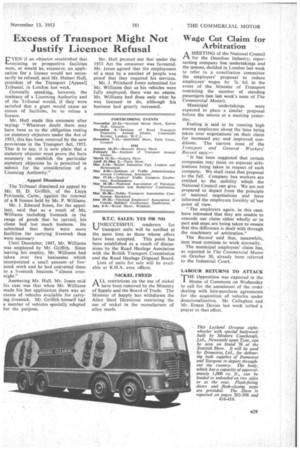Excess of Transport Might Not Justify Licence Refusal
Page 63

If you've noticed an error in this article please click here to report it so we can fix it.
VEN if an objector established that existing or prospective facilities were, or would be, excessive, an application for a licence would not necessarily be refused, said Mr. Hubert Hull, president of the Transport [Appeal] Tribunal, in London last week.
Generally speaking,, however, the tendency of a Licensing Authority and of the Tribunal would, if they were -satisfied that a grant would cause an excess of facilities, be to refuse a licence.
Mr. Hull made this comment after saying: " Whatever doubt there may have been as to the obligation resting on statutory objectors under the Act of 1933, this has been removed by the new provisions in the Transport Act, 1953. That is to say, it is now plain that a statutory objector must prove the facts necessary to establish the particular statutory objection he is permitted to submit for the consideration of a Licensing Authority."
Appeal Dismissed The Tribunal dismissed an appeal by Mr. H. D. Griffith, of the Lleyn Pe-Itinsula, Calm., against the renewal of a B licence held by Mr. P. Williams.
Mr. J. Edward Jones, for the appellant, said that as a result of ME. Williams including livestock in the range of goods that he carried, his client had lost much business. He submitted that there were more facilities for carrying livestock than were necessary Until December, 1947, Mr. Williams was employed by Mr. Griffith. Since leaving his employ, Mr. Williams had taken over two businesses which incorporated a small amount • of live. stock work and he had converted them to a livestock business " almost overnight". Answering Mr. Hull,Mr. Jones said his case was that when Mr. Williams made his last application there was an excess of vehicles available for carrying livestock. Mr. Griffith himself had a number of vehicles specially adapted for the purpose. Mr. Hull pointed out that under the 1953 Act the consumer was favoured. Mr. Jones agreed that the employment of a man by a number of people was proof that they required his services. Mr. I, Pritchard Jones submitted for --Mr. Williams that as his vehicles were fully employed, there was no excess. Mr. Williams had done only what he was licensed to do, although his business had greatly increased.












































































































































































































































